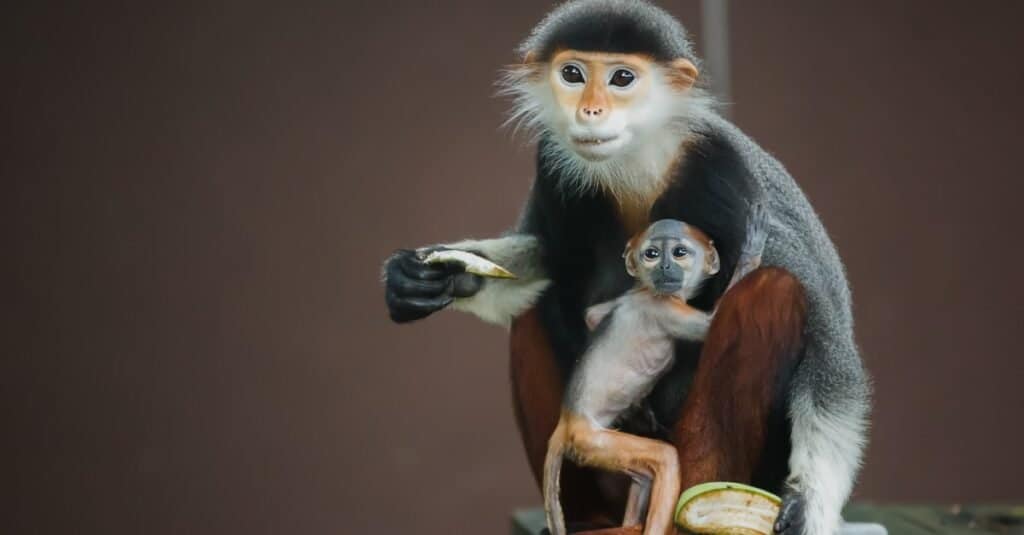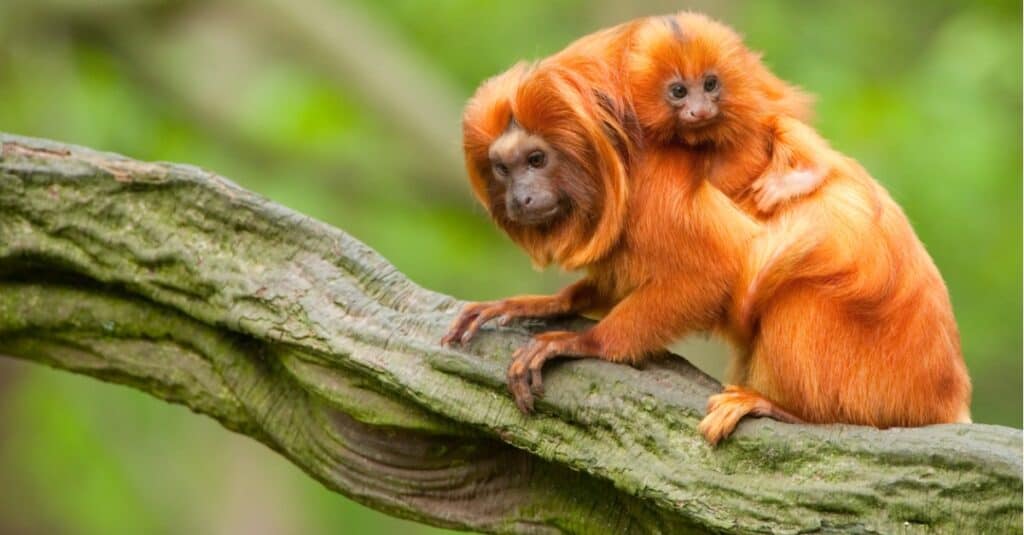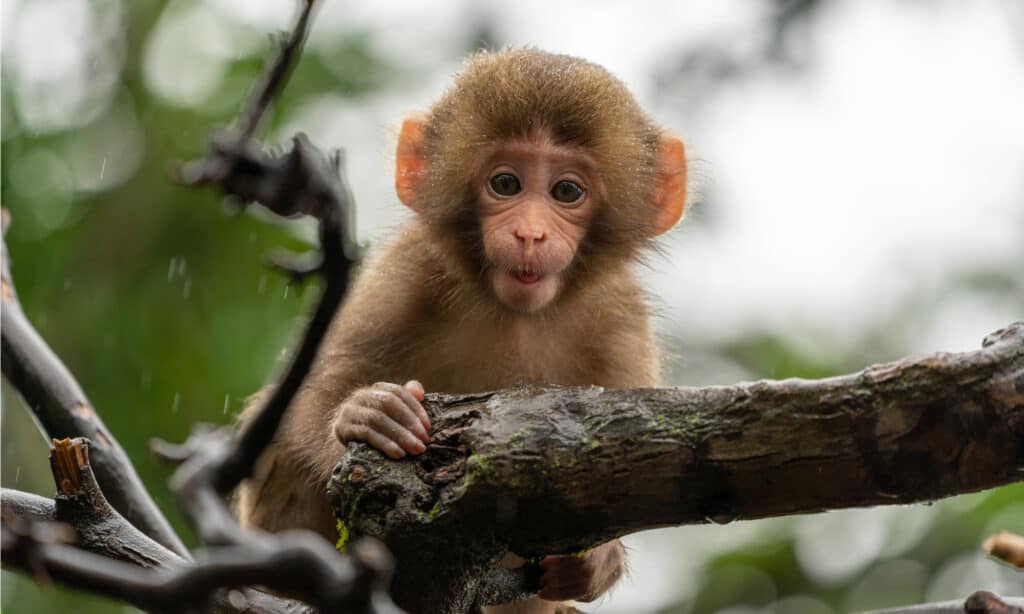With their keen intelligence and adorable faces, baby monkeys inspire much the same reaction in humans as puppies and kittens. Moreover, there are so many similarities between humans and monkeys that we may even feel a certain kinship with them. There are over 260 species of monkeys in the world, belonging to either the Old World or New World monkeys, but most species have certain things in common as infants. Read on to discover eight fascinating facts about baby monkeys!
1. Baby Monkeys Are Called Infants

nattanan726/Shutterstock.com
It’s no coincidence that scientists call baby monkeys “infants,” just like human babies. Monkeys are closely related to us, sharing over 90% of their DNA with their human cousins. However, they are not as closely related to us as great apes like chimpanzees and bonobos, who share over 98% of our DNA.
Monkeys are among the most intelligent creatures on earth. This causes monkey infants to be incredibly curious and often mischievous. Some studies have found that primates can be as smart as human toddlers. However, this appears to be the natural limit to their intelligence. Despite their similar social structures and impressive cognitive abilities, monkeys still cannot form human words or solve problems at our level.
2. Baby Monkeys Stay In Their Mothers’ Arms for up to 2 Weeks
Baby monkeys are extremely vulnerable to all kinds of threats, including the elements. Their arms are also too weak to hold on to their mother. For these reasons, their mother clutches them to her chest after birth for a period ranging from several days to two weeks. At this point, she transfers them to her back, where they cling to her while she moves through the trees.
Though the mother bears the main burden of raising young, in some monkey species, the father helps out. Male titi monkeys, for example, carry their offspring from birth and form strong attachments with them.
3. Baby Monkeys Can Develop Separation Anxiety

iStock.com/Enjoylife2
A study has shown a link between the early separation of baby monkeys from their mothers and increased anxiety. Scientists conducted the study on rhesus monkeys, comparing those who stayed with their mothers at a young age with those who endured separation. The monkeys, without the benefit of their mothers, developed numerous social and emotional problems such as anxiety, depression, and maladaptive behaviors like thumb-sucking. Even after returning to their mothers, they continued to struggle.
The researchers concluded that a return to normality wasn’t a predictor of improved mental health. Long after the separation ended, the young monkeys had trouble integrating into their societies and living healthy lives. This research has implications for humans who suffer abuse or other hardships early in life.
4. Breast Milk Influences Baby Monkeys’ Personalities
Another study found that the quality of a female monkey’s breast milk helped determine the personalities of monkey infants. Researchers studied 59 rhesus monkey females with infants, comparing the quality of the various individuals’ breast milk. There were natural variations depending on the size of the females and whether they had had prior pregnancies. The mothers with greater mass and more experience produced higher-quality breast milk with increased amounts of proteins, fats, and sugars. The higher the quality, the more energy the breast milk provided to the infants.
After analyzing the milk quality, researchers temporarily separated the infants from their mothers. They discovered that the infants who received higher-quality breast milk were more confident, curious, and well-adapted on their own than were the recipients of lower-quality milk. Thus, breast milk appeared to play a crucial role in the development of infants’ personalities and competencies.
5. Crying Baby Monkeys Get Their Mothers in Trouble
Just like humans, monkeys find crying babies irritating. Not only do baby monkeys cry and scream much like human babies do, but their mothers face similar consequences from those around them. Studies have shown that when monkey infants cry and aren’t hushed by their mothers, other monkeys in the vicinity feel free to express their displeasure. Inattentive mothers and their noisy offspring risk the bites, slaps, and shoves of other adults in the group. Chances of an attack increase by 35 times when the mother doesn’t quiet her infant.
Not coincidentally, mother monkeys are twice as likely to respond to their babies’ vocalizations when they are in the company of other monkeys, as opposed to by themselves or among relatives. Monkeys related to the mother appear to be more understanding and less likely to unleash their wrath.
6. Monkey Infants Learn to “Speak” Through Baby Talk

exs_yori/Shutterstock.com
Human mothers engage in “baby talk” with their infants all the time, but did you know that monkey mothers do it too? Studies show that female monkeys’ vocalizations are different when directed at their infants as opposed to other adult monkeys. As with human baby talk, monkey baby talk is higher-pitched, slower, and more distinctive. This makes it easier for inexperienced infants to understand.
Monkey infants pick up social and emotional cues through this baby talk and learn how to vocalize themselves. The baby talk serves to clearly forbid an action or approve it; it can also be comforting or draw the infant’s attention.
7. Baby Monkeys Exchange Affection With Their Mothers
Despite the aggression of some primate species, monkeys generally are capable of great affection and care. This is especially true between mothers and their babies. Female monkeys not only cuddle their infants, but they also cup their faces, gaze into their eyes, and kiss them. Monkey infants are capable of reciprocating such gestures. Because they learn from their mothers and other members of society, they grow up to mirror such behavior in their young.
8. Baby Monkeys Play Much Like Human Children
Monkey infants learn key motor skills through playing with others. Without activities like jumping, wrestling, and running, they grow up lacking vital abilities. There is an energy cost to playing, of course: both human and nonhuman animals that play in their youth appear to sacrifice some of their growth potential. However, without play, they are stunted in other crucial ways. Generally, the benefits of playing outweigh the drawbacks.
Though there are many differences between human infants and monkey infants, there are enough similarities that understanding them better can help us understand ourselves.
Up Next:
- Are Monkeys Primates?
- Group of Monkeys and Their Behaviors?
- How Do Monkeys Mate? Monkey Reproduction Habits Explained
The post Baby Monkey appeared first on AZ Animals.
from Animal News, Facts, Rankings, and More! - AZ Animals https://ift.tt/YIRmS9i